Evaluating International HRM Challenges: Ventrica in Japanese Market
VerifiedAdded on 2022/12/26
|10
|3438
|35
Report
AI Summary
This report analyzes the international human resource management (IHRM) challenges faced by Ventrica, a UK-based outsourcing company, when establishing a call center in Japan. It explores various cultural issues, including religious and cultural barriers, management practices, ethical considerations, language differences, and relationship-building challenges. The report applies Hofstede's cultural dimensions theory to understand cultural differences between the UK and Japan. It discusses the advantages and disadvantages of this theory. Furthermore, the report examines specific IHRM issues like job security, attracting skilled employees, the selection process, employee turnover, and training and development. The document highlights the importance of adapting HRM practices to the Japanese context for successful business operations and expansion. The report concludes by emphasizing the need for Ventrica to carefully consider cultural factors and IHRM strategies to overcome challenges and achieve its goals in the Japanese market.
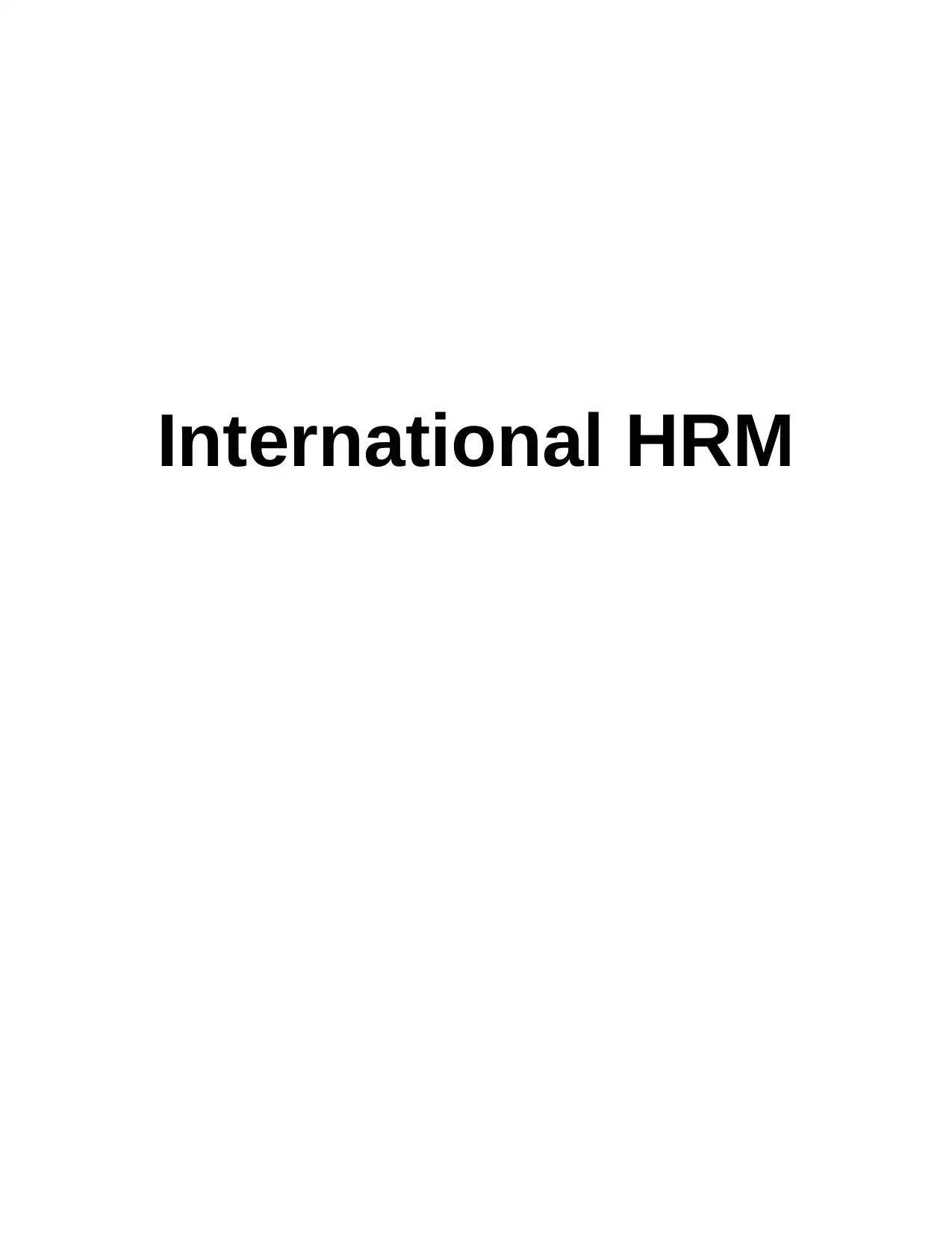
International HRM
Paraphrase This Document
Need a fresh take? Get an instant paraphrase of this document with our AI Paraphraser
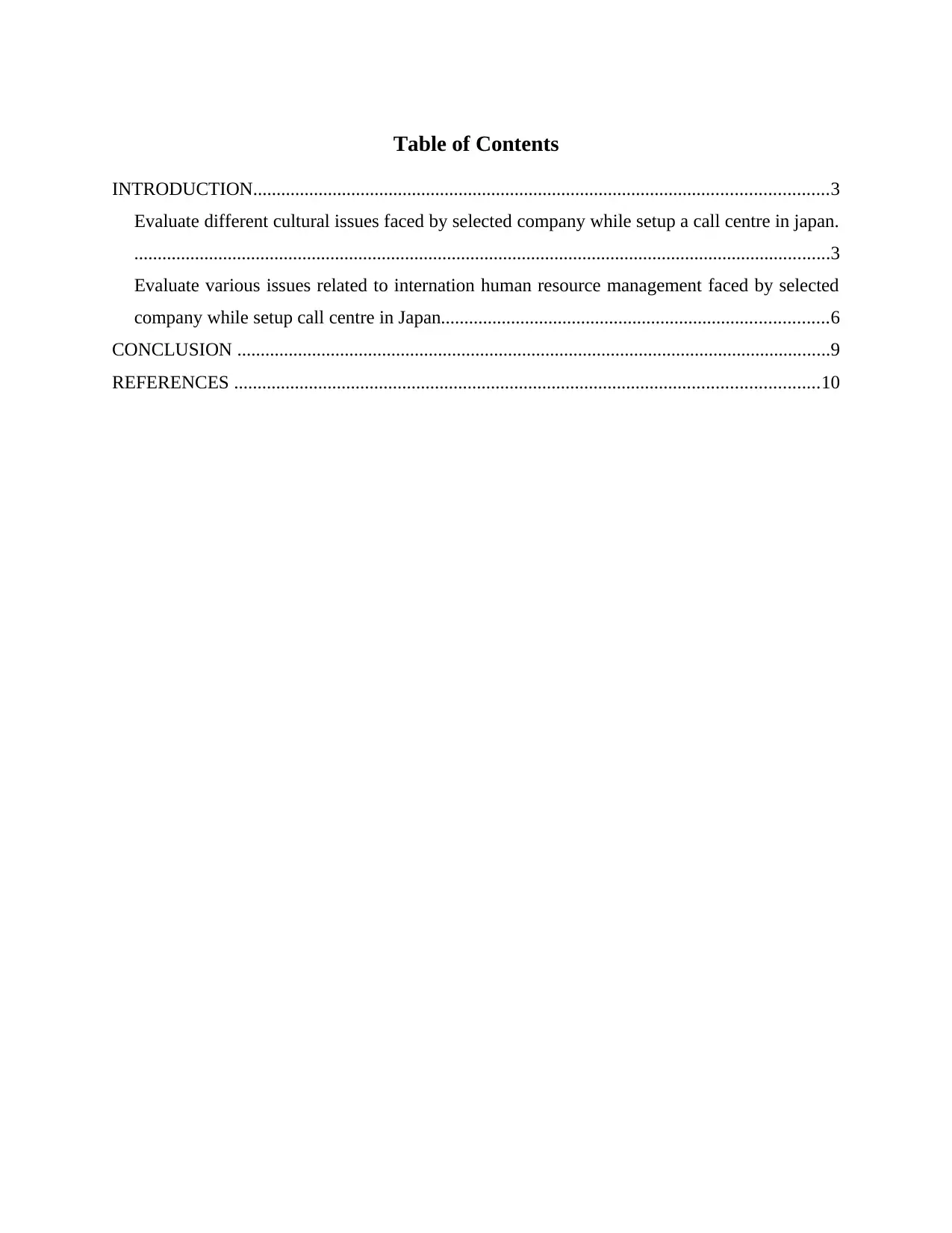
Table of Contents
INTRODUCTION...........................................................................................................................3
Evaluate different cultural issues faced by selected company while setup a call centre in japan.
.....................................................................................................................................................3
Evaluate various issues related to internation human resource management faced by selected
company while setup call centre in Japan...................................................................................6
CONCLUSION ...............................................................................................................................9
REFERENCES .............................................................................................................................10
INTRODUCTION...........................................................................................................................3
Evaluate different cultural issues faced by selected company while setup a call centre in japan.
.....................................................................................................................................................3
Evaluate various issues related to internation human resource management faced by selected
company while setup call centre in Japan...................................................................................6
CONCLUSION ...............................................................................................................................9
REFERENCES .............................................................................................................................10
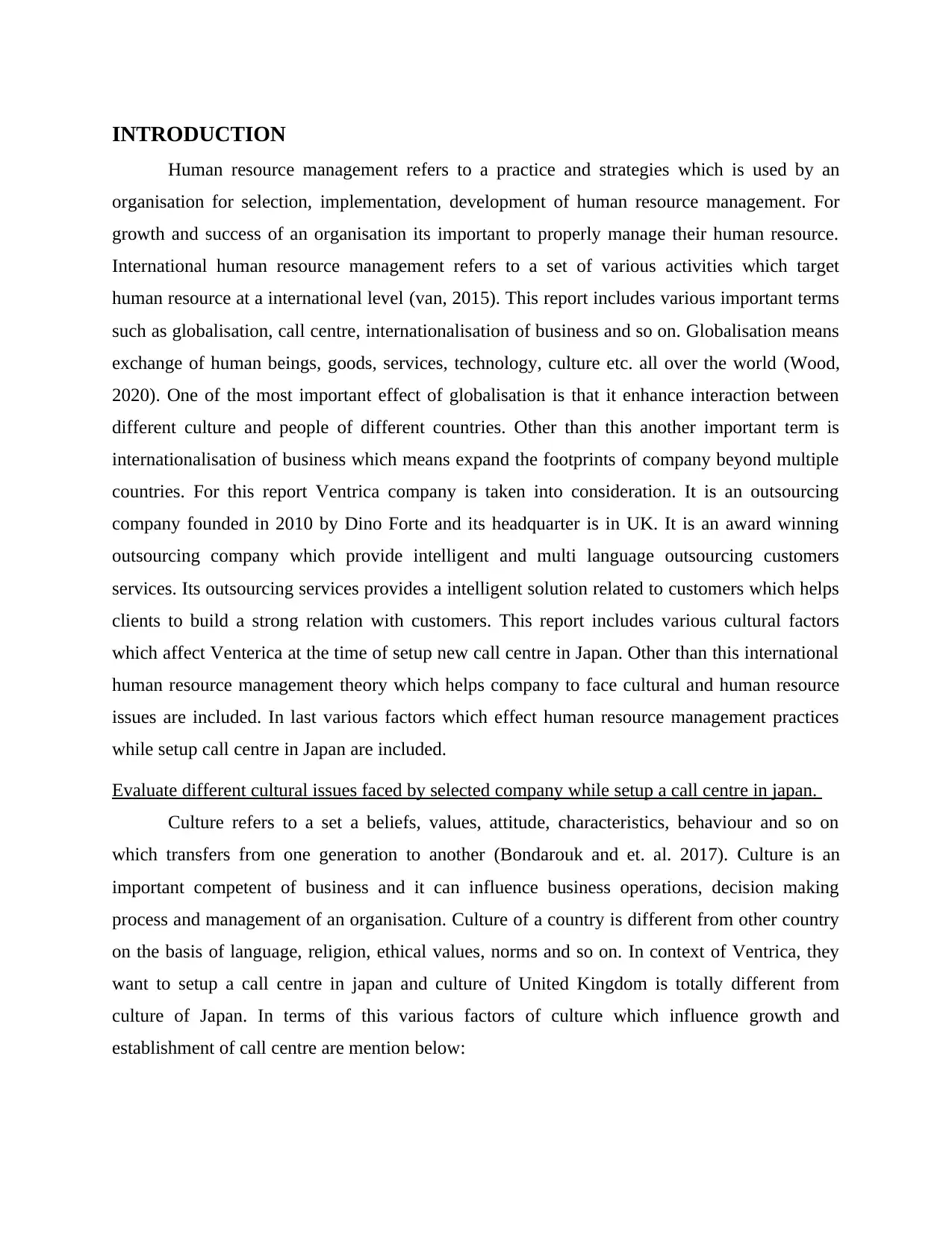
INTRODUCTION
Human resource management refers to a practice and strategies which is used by an
organisation for selection, implementation, development of human resource management. For
growth and success of an organisation its important to properly manage their human resource.
International human resource management refers to a set of various activities which target
human resource at a international level (van, 2015). This report includes various important terms
such as globalisation, call centre, internationalisation of business and so on. Globalisation means
exchange of human beings, goods, services, technology, culture etc. all over the world (Wood,
2020). One of the most important effect of globalisation is that it enhance interaction between
different culture and people of different countries. Other than this another important term is
internationalisation of business which means expand the footprints of company beyond multiple
countries. For this report Ventrica company is taken into consideration. It is an outsourcing
company founded in 2010 by Dino Forte and its headquarter is in UK. It is an award winning
outsourcing company which provide intelligent and multi language outsourcing customers
services. Its outsourcing services provides a intelligent solution related to customers which helps
clients to build a strong relation with customers. This report includes various cultural factors
which affect Venterica at the time of setup new call centre in Japan. Other than this international
human resource management theory which helps company to face cultural and human resource
issues are included. In last various factors which effect human resource management practices
while setup call centre in Japan are included.
Evaluate different cultural issues faced by selected company while setup a call centre in japan.
Culture refers to a set a beliefs, values, attitude, characteristics, behaviour and so on
which transfers from one generation to another (Bondarouk and et. al. 2017). Culture is an
important competent of business and it can influence business operations, decision making
process and management of an organisation. Culture of a country is different from other country
on the basis of language, religion, ethical values, norms and so on. In context of Ventrica, they
want to setup a call centre in japan and culture of United Kingdom is totally different from
culture of Japan. In terms of this various factors of culture which influence growth and
establishment of call centre are mention below:
Human resource management refers to a practice and strategies which is used by an
organisation for selection, implementation, development of human resource management. For
growth and success of an organisation its important to properly manage their human resource.
International human resource management refers to a set of various activities which target
human resource at a international level (van, 2015). This report includes various important terms
such as globalisation, call centre, internationalisation of business and so on. Globalisation means
exchange of human beings, goods, services, technology, culture etc. all over the world (Wood,
2020). One of the most important effect of globalisation is that it enhance interaction between
different culture and people of different countries. Other than this another important term is
internationalisation of business which means expand the footprints of company beyond multiple
countries. For this report Ventrica company is taken into consideration. It is an outsourcing
company founded in 2010 by Dino Forte and its headquarter is in UK. It is an award winning
outsourcing company which provide intelligent and multi language outsourcing customers
services. Its outsourcing services provides a intelligent solution related to customers which helps
clients to build a strong relation with customers. This report includes various cultural factors
which affect Venterica at the time of setup new call centre in Japan. Other than this international
human resource management theory which helps company to face cultural and human resource
issues are included. In last various factors which effect human resource management practices
while setup call centre in Japan are included.
Evaluate different cultural issues faced by selected company while setup a call centre in japan.
Culture refers to a set a beliefs, values, attitude, characteristics, behaviour and so on
which transfers from one generation to another (Bondarouk and et. al. 2017). Culture is an
important competent of business and it can influence business operations, decision making
process and management of an organisation. Culture of a country is different from other country
on the basis of language, religion, ethical values, norms and so on. In context of Ventrica, they
want to setup a call centre in japan and culture of United Kingdom is totally different from
culture of Japan. In terms of this various factors of culture which influence growth and
establishment of call centre are mention below:
⊘ This is a preview!⊘
Do you want full access?
Subscribe today to unlock all pages.

Trusted by 1+ million students worldwide
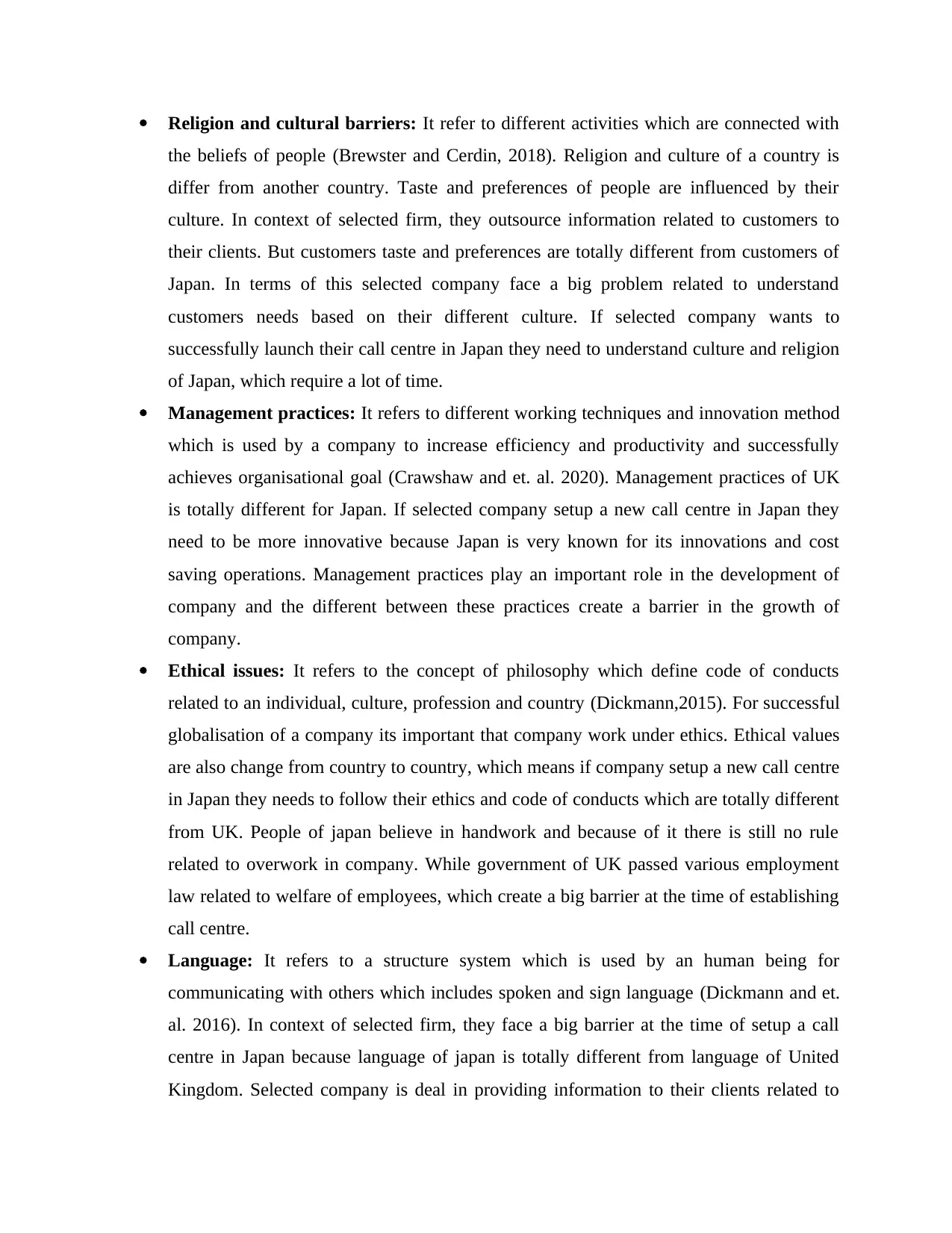
Religion and cultural barriers: It refer to different activities which are connected with
the beliefs of people (Brewster and Cerdin, 2018). Religion and culture of a country is
differ from another country. Taste and preferences of people are influenced by their
culture. In context of selected firm, they outsource information related to customers to
their clients. But customers taste and preferences are totally different from customers of
Japan. In terms of this selected company face a big problem related to understand
customers needs based on their different culture. If selected company wants to
successfully launch their call centre in Japan they need to understand culture and religion
of Japan, which require a lot of time.
Management practices: It refers to different working techniques and innovation method
which is used by a company to increase efficiency and productivity and successfully
achieves organisational goal (Crawshaw and et. al. 2020). Management practices of UK
is totally different for Japan. If selected company setup a new call centre in Japan they
need to be more innovative because Japan is very known for its innovations and cost
saving operations. Management practices play an important role in the development of
company and the different between these practices create a barrier in the growth of
company.
Ethical issues: It refers to the concept of philosophy which define code of conducts
related to an individual, culture, profession and country (Dickmann,2015). For successful
globalisation of a company its important that company work under ethics. Ethical values
are also change from country to country, which means if company setup a new call centre
in Japan they needs to follow their ethics and code of conducts which are totally different
from UK. People of japan believe in handwork and because of it there is still no rule
related to overwork in company. While government of UK passed various employment
law related to welfare of employees, which create a big barrier at the time of establishing
call centre.
Language: It refers to a structure system which is used by an human being for
communicating with others which includes spoken and sign language (Dickmann and et.
al. 2016). In context of selected firm, they face a big barrier at the time of setup a call
centre in Japan because language of japan is totally different from language of United
Kingdom. Selected company is deal in providing information to their clients related to
the beliefs of people (Brewster and Cerdin, 2018). Religion and culture of a country is
differ from another country. Taste and preferences of people are influenced by their
culture. In context of selected firm, they outsource information related to customers to
their clients. But customers taste and preferences are totally different from customers of
Japan. In terms of this selected company face a big problem related to understand
customers needs based on their different culture. If selected company wants to
successfully launch their call centre in Japan they need to understand culture and religion
of Japan, which require a lot of time.
Management practices: It refers to different working techniques and innovation method
which is used by a company to increase efficiency and productivity and successfully
achieves organisational goal (Crawshaw and et. al. 2020). Management practices of UK
is totally different for Japan. If selected company setup a new call centre in Japan they
need to be more innovative because Japan is very known for its innovations and cost
saving operations. Management practices play an important role in the development of
company and the different between these practices create a barrier in the growth of
company.
Ethical issues: It refers to the concept of philosophy which define code of conducts
related to an individual, culture, profession and country (Dickmann,2015). For successful
globalisation of a company its important that company work under ethics. Ethical values
are also change from country to country, which means if company setup a new call centre
in Japan they needs to follow their ethics and code of conducts which are totally different
from UK. People of japan believe in handwork and because of it there is still no rule
related to overwork in company. While government of UK passed various employment
law related to welfare of employees, which create a big barrier at the time of establishing
call centre.
Language: It refers to a structure system which is used by an human being for
communicating with others which includes spoken and sign language (Dickmann and et.
al. 2016). In context of selected firm, they face a big barrier at the time of setup a call
centre in Japan because language of japan is totally different from language of United
Kingdom. Selected company is deal in providing information to their clients related to
Paraphrase This Document
Need a fresh take? Get an instant paraphrase of this document with our AI Paraphraser
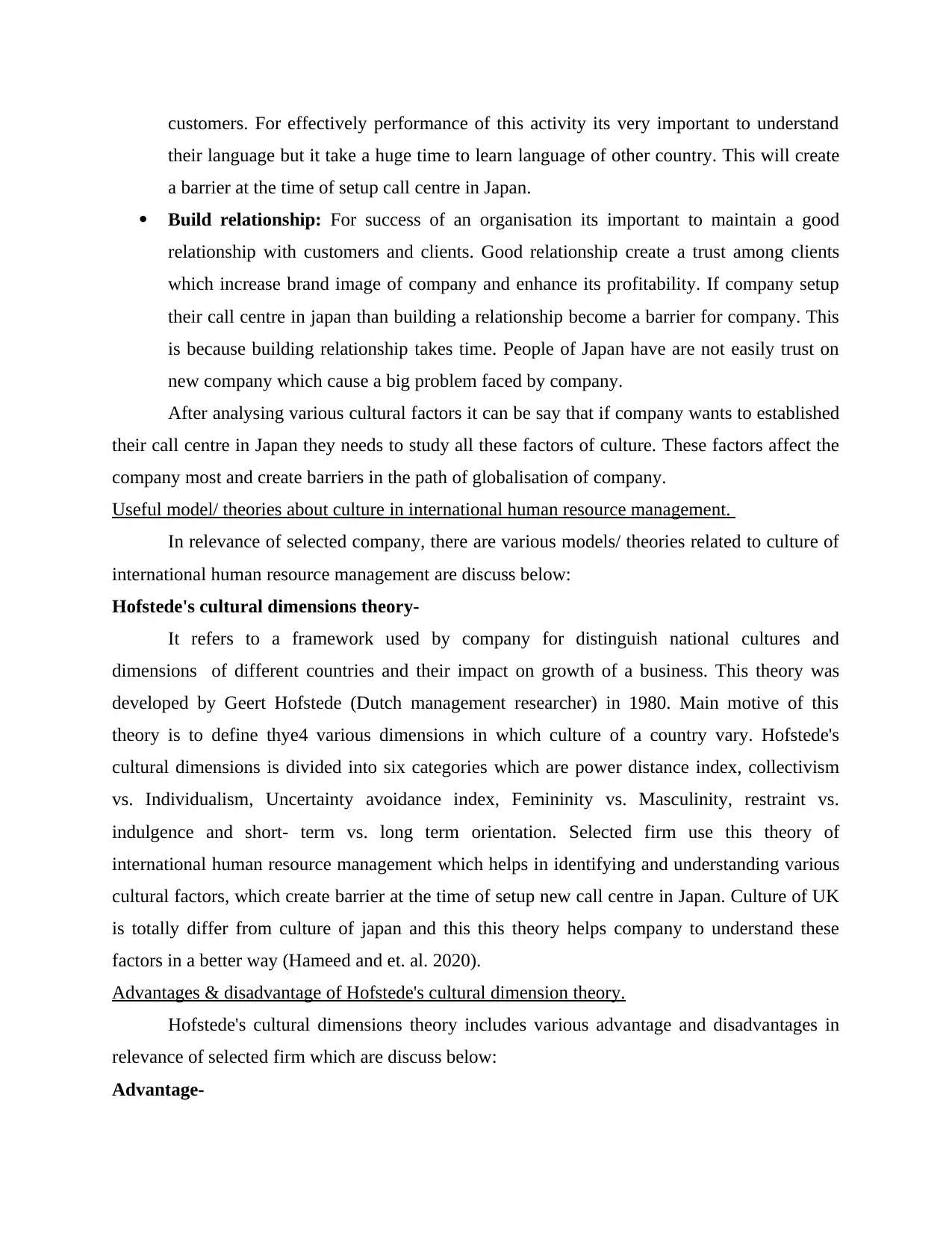
customers. For effectively performance of this activity its very important to understand
their language but it take a huge time to learn language of other country. This will create
a barrier at the time of setup call centre in Japan.
Build relationship: For success of an organisation its important to maintain a good
relationship with customers and clients. Good relationship create a trust among clients
which increase brand image of company and enhance its profitability. If company setup
their call centre in japan than building a relationship become a barrier for company. This
is because building relationship takes time. People of Japan have are not easily trust on
new company which cause a big problem faced by company.
After analysing various cultural factors it can be say that if company wants to established
their call centre in Japan they needs to study all these factors of culture. These factors affect the
company most and create barriers in the path of globalisation of company.
Useful model/ theories about culture in international human resource management.
In relevance of selected company, there are various models/ theories related to culture of
international human resource management are discuss below:
Hofstede's cultural dimensions theory-
It refers to a framework used by company for distinguish national cultures and
dimensions of different countries and their impact on growth of a business. This theory was
developed by Geert Hofstede (Dutch management researcher) in 1980. Main motive of this
theory is to define thye4 various dimensions in which culture of a country vary. Hofstede's
cultural dimensions is divided into six categories which are power distance index, collectivism
vs. Individualism, Uncertainty avoidance index, Femininity vs. Masculinity, restraint vs.
indulgence and short- term vs. long term orientation. Selected firm use this theory of
international human resource management which helps in identifying and understanding various
cultural factors, which create barrier at the time of setup new call centre in Japan. Culture of UK
is totally differ from culture of japan and this this theory helps company to understand these
factors in a better way (Hameed and et. al. 2020).
Advantages & disadvantage of Hofstede's cultural dimension theory.
Hofstede's cultural dimensions theory includes various advantage and disadvantages in
relevance of selected firm which are discuss below:
Advantage-
their language but it take a huge time to learn language of other country. This will create
a barrier at the time of setup call centre in Japan.
Build relationship: For success of an organisation its important to maintain a good
relationship with customers and clients. Good relationship create a trust among clients
which increase brand image of company and enhance its profitability. If company setup
their call centre in japan than building a relationship become a barrier for company. This
is because building relationship takes time. People of Japan have are not easily trust on
new company which cause a big problem faced by company.
After analysing various cultural factors it can be say that if company wants to established
their call centre in Japan they needs to study all these factors of culture. These factors affect the
company most and create barriers in the path of globalisation of company.
Useful model/ theories about culture in international human resource management.
In relevance of selected company, there are various models/ theories related to culture of
international human resource management are discuss below:
Hofstede's cultural dimensions theory-
It refers to a framework used by company for distinguish national cultures and
dimensions of different countries and their impact on growth of a business. This theory was
developed by Geert Hofstede (Dutch management researcher) in 1980. Main motive of this
theory is to define thye4 various dimensions in which culture of a country vary. Hofstede's
cultural dimensions is divided into six categories which are power distance index, collectivism
vs. Individualism, Uncertainty avoidance index, Femininity vs. Masculinity, restraint vs.
indulgence and short- term vs. long term orientation. Selected firm use this theory of
international human resource management which helps in identifying and understanding various
cultural factors, which create barrier at the time of setup new call centre in Japan. Culture of UK
is totally differ from culture of japan and this this theory helps company to understand these
factors in a better way (Hameed and et. al. 2020).
Advantages & disadvantage of Hofstede's cultural dimension theory.
Hofstede's cultural dimensions theory includes various advantage and disadvantages in
relevance of selected firm which are discuss below:
Advantage-
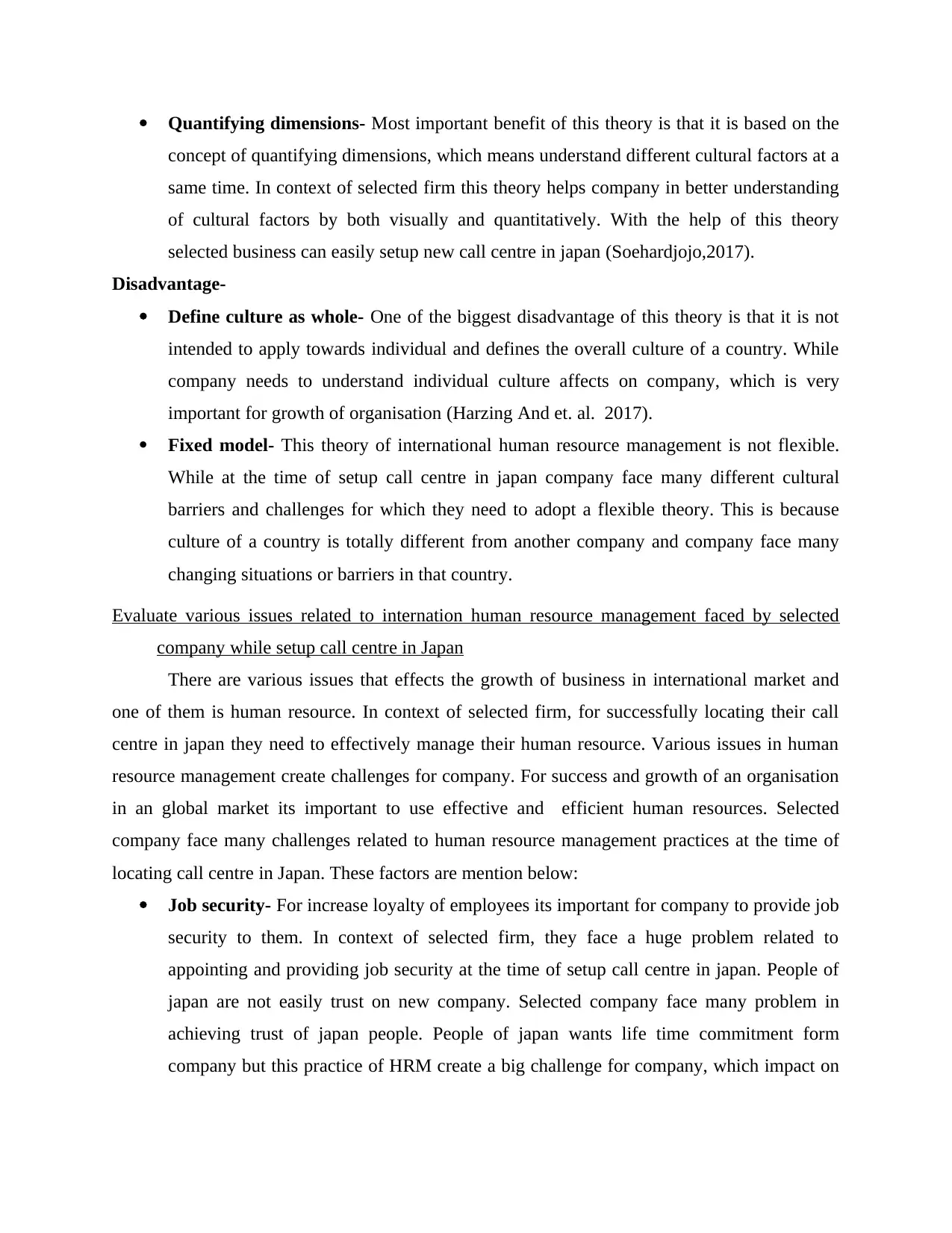
Quantifying dimensions- Most important benefit of this theory is that it is based on the
concept of quantifying dimensions, which means understand different cultural factors at a
same time. In context of selected firm this theory helps company in better understanding
of cultural factors by both visually and quantitatively. With the help of this theory
selected business can easily setup new call centre in japan (Soehardjojo,2017).
Disadvantage-
Define culture as whole- One of the biggest disadvantage of this theory is that it is not
intended to apply towards individual and defines the overall culture of a country. While
company needs to understand individual culture affects on company, which is very
important for growth of organisation (Harzing And et. al. 2017).
Fixed model- This theory of international human resource management is not flexible.
While at the time of setup call centre in japan company face many different cultural
barriers and challenges for which they need to adopt a flexible theory. This is because
culture of a country is totally different from another company and company face many
changing situations or barriers in that country.
Evaluate various issues related to internation human resource management faced by selected
company while setup call centre in Japan
There are various issues that effects the growth of business in international market and
one of them is human resource. In context of selected firm, for successfully locating their call
centre in japan they need to effectively manage their human resource. Various issues in human
resource management create challenges for company. For success and growth of an organisation
in an global market its important to use effective and efficient human resources. Selected
company face many challenges related to human resource management practices at the time of
locating call centre in Japan. These factors are mention below:
Job security- For increase loyalty of employees its important for company to provide job
security to them. In context of selected firm, they face a huge problem related to
appointing and providing job security at the time of setup call centre in japan. People of
japan are not easily trust on new company. Selected company face many problem in
achieving trust of japan people. People of japan wants life time commitment form
company but this practice of HRM create a big challenge for company, which impact on
concept of quantifying dimensions, which means understand different cultural factors at a
same time. In context of selected firm this theory helps company in better understanding
of cultural factors by both visually and quantitatively. With the help of this theory
selected business can easily setup new call centre in japan (Soehardjojo,2017).
Disadvantage-
Define culture as whole- One of the biggest disadvantage of this theory is that it is not
intended to apply towards individual and defines the overall culture of a country. While
company needs to understand individual culture affects on company, which is very
important for growth of organisation (Harzing And et. al. 2017).
Fixed model- This theory of international human resource management is not flexible.
While at the time of setup call centre in japan company face many different cultural
barriers and challenges for which they need to adopt a flexible theory. This is because
culture of a country is totally different from another company and company face many
changing situations or barriers in that country.
Evaluate various issues related to internation human resource management faced by selected
company while setup call centre in Japan
There are various issues that effects the growth of business in international market and
one of them is human resource. In context of selected firm, for successfully locating their call
centre in japan they need to effectively manage their human resource. Various issues in human
resource management create challenges for company. For success and growth of an organisation
in an global market its important to use effective and efficient human resources. Selected
company face many challenges related to human resource management practices at the time of
locating call centre in Japan. These factors are mention below:
Job security- For increase loyalty of employees its important for company to provide job
security to them. In context of selected firm, they face a huge problem related to
appointing and providing job security at the time of setup call centre in japan. People of
japan are not easily trust on new company. Selected company face many problem in
achieving trust of japan people. People of japan wants life time commitment form
company but this practice of HRM create a big challenge for company, which impact on
⊘ This is a preview!⊘
Do you want full access?
Subscribe today to unlock all pages.

Trusted by 1+ million students worldwide
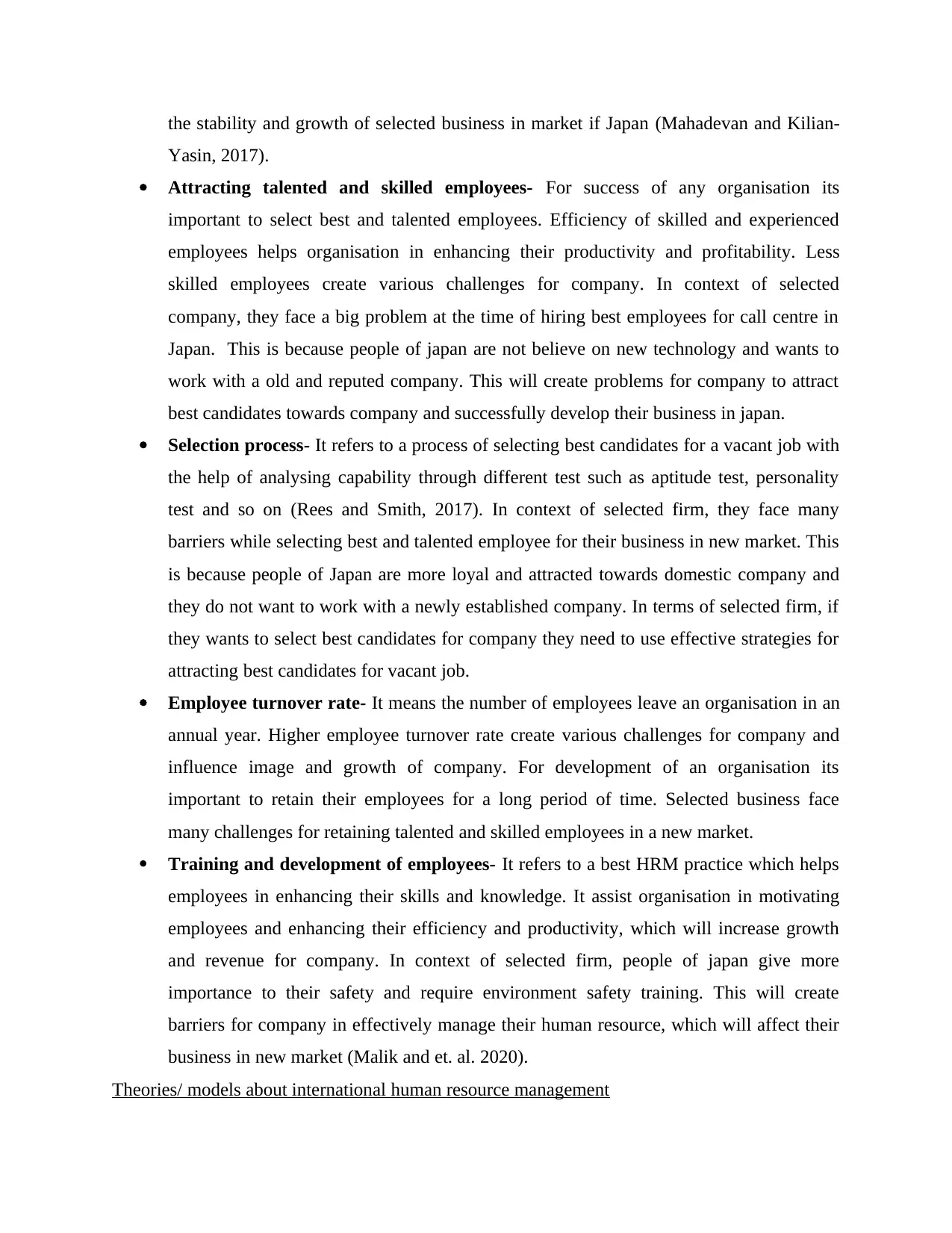
the stability and growth of selected business in market if Japan (Mahadevan and Kilian-
Yasin, 2017).
Attracting talented and skilled employees- For success of any organisation its
important to select best and talented employees. Efficiency of skilled and experienced
employees helps organisation in enhancing their productivity and profitability. Less
skilled employees create various challenges for company. In context of selected
company, they face a big problem at the time of hiring best employees for call centre in
Japan. This is because people of japan are not believe on new technology and wants to
work with a old and reputed company. This will create problems for company to attract
best candidates towards company and successfully develop their business in japan.
Selection process- It refers to a process of selecting best candidates for a vacant job with
the help of analysing capability through different test such as aptitude test, personality
test and so on (Rees and Smith, 2017). In context of selected firm, they face many
barriers while selecting best and talented employee for their business in new market. This
is because people of Japan are more loyal and attracted towards domestic company and
they do not want to work with a newly established company. In terms of selected firm, if
they wants to select best candidates for company they need to use effective strategies for
attracting best candidates for vacant job.
Employee turnover rate- It means the number of employees leave an organisation in an
annual year. Higher employee turnover rate create various challenges for company and
influence image and growth of company. For development of an organisation its
important to retain their employees for a long period of time. Selected business face
many challenges for retaining talented and skilled employees in a new market.
Training and development of employees- It refers to a best HRM practice which helps
employees in enhancing their skills and knowledge. It assist organisation in motivating
employees and enhancing their efficiency and productivity, which will increase growth
and revenue for company. In context of selected firm, people of japan give more
importance to their safety and require environment safety training. This will create
barriers for company in effectively manage their human resource, which will affect their
business in new market (Malik and et. al. 2020).
Theories/ models about international human resource management
Yasin, 2017).
Attracting talented and skilled employees- For success of any organisation its
important to select best and talented employees. Efficiency of skilled and experienced
employees helps organisation in enhancing their productivity and profitability. Less
skilled employees create various challenges for company. In context of selected
company, they face a big problem at the time of hiring best employees for call centre in
Japan. This is because people of japan are not believe on new technology and wants to
work with a old and reputed company. This will create problems for company to attract
best candidates towards company and successfully develop their business in japan.
Selection process- It refers to a process of selecting best candidates for a vacant job with
the help of analysing capability through different test such as aptitude test, personality
test and so on (Rees and Smith, 2017). In context of selected firm, they face many
barriers while selecting best and talented employee for their business in new market. This
is because people of Japan are more loyal and attracted towards domestic company and
they do not want to work with a newly established company. In terms of selected firm, if
they wants to select best candidates for company they need to use effective strategies for
attracting best candidates for vacant job.
Employee turnover rate- It means the number of employees leave an organisation in an
annual year. Higher employee turnover rate create various challenges for company and
influence image and growth of company. For development of an organisation its
important to retain their employees for a long period of time. Selected business face
many challenges for retaining talented and skilled employees in a new market.
Training and development of employees- It refers to a best HRM practice which helps
employees in enhancing their skills and knowledge. It assist organisation in motivating
employees and enhancing their efficiency and productivity, which will increase growth
and revenue for company. In context of selected firm, people of japan give more
importance to their safety and require environment safety training. This will create
barriers for company in effectively manage their human resource, which will affect their
business in new market (Malik and et. al. 2020).
Theories/ models about international human resource management
Paraphrase This Document
Need a fresh take? Get an instant paraphrase of this document with our AI Paraphraser
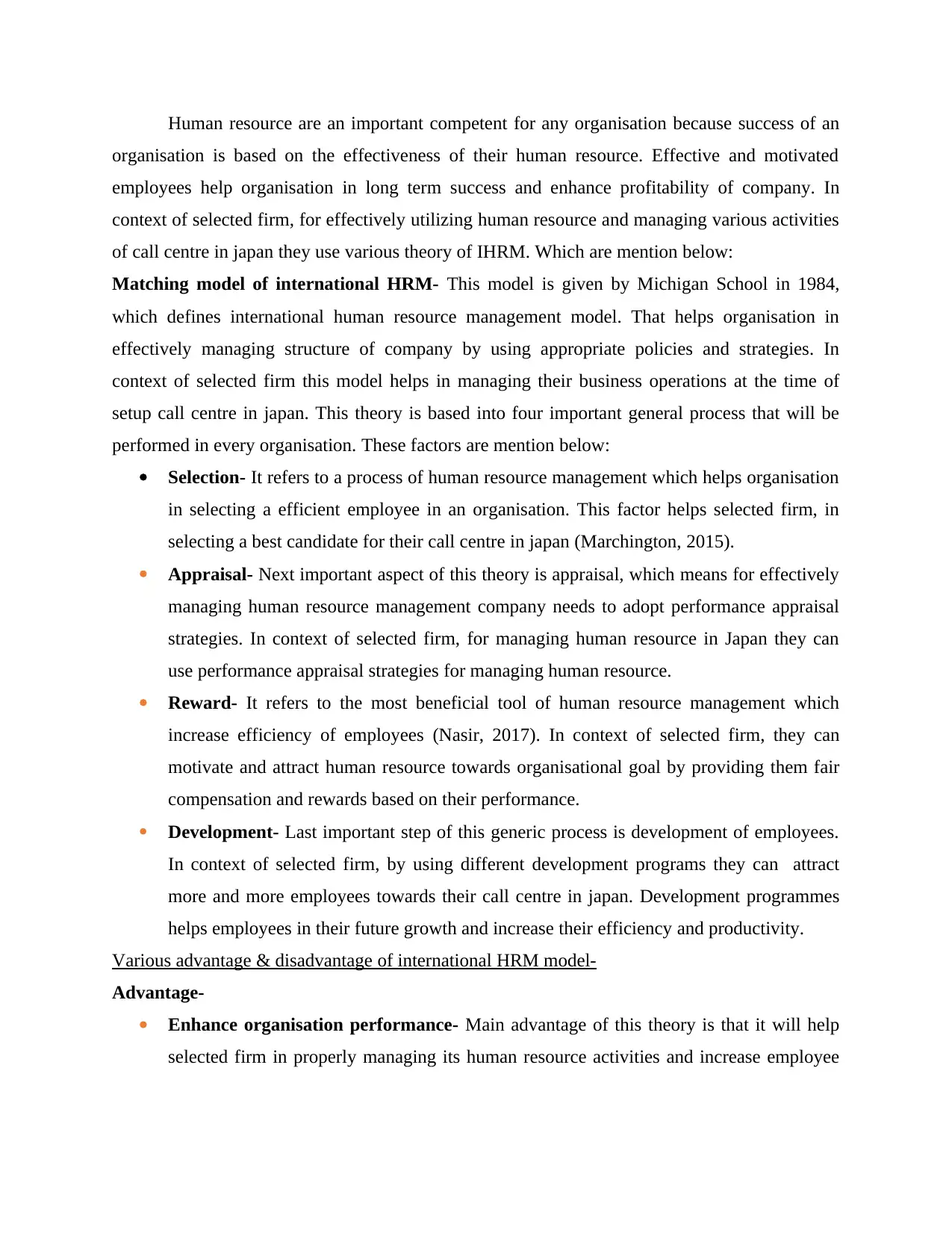
Human resource are an important competent for any organisation because success of an
organisation is based on the effectiveness of their human resource. Effective and motivated
employees help organisation in long term success and enhance profitability of company. In
context of selected firm, for effectively utilizing human resource and managing various activities
of call centre in japan they use various theory of IHRM. Which are mention below:
Matching model of international HRM- This model is given by Michigan School in 1984,
which defines international human resource management model. That helps organisation in
effectively managing structure of company by using appropriate policies and strategies. In
context of selected firm this model helps in managing their business operations at the time of
setup call centre in japan. This theory is based into four important general process that will be
performed in every organisation. These factors are mention below:
Selection- It refers to a process of human resource management which helps organisation
in selecting a efficient employee in an organisation. This factor helps selected firm, in
selecting a best candidate for their call centre in japan (Marchington, 2015).
Appraisal- Next important aspect of this theory is appraisal, which means for effectively
managing human resource management company needs to adopt performance appraisal
strategies. In context of selected firm, for managing human resource in Japan they can
use performance appraisal strategies for managing human resource.
Reward- It refers to the most beneficial tool of human resource management which
increase efficiency of employees (Nasir, 2017). In context of selected firm, they can
motivate and attract human resource towards organisational goal by providing them fair
compensation and rewards based on their performance.
Development- Last important step of this generic process is development of employees.
In context of selected firm, by using different development programs they can attract
more and more employees towards their call centre in japan. Development programmes
helps employees in their future growth and increase their efficiency and productivity.
Various advantage & disadvantage of international HRM model-
Advantage-
Enhance organisation performance- Main advantage of this theory is that it will help
selected firm in properly managing its human resource activities and increase employee
organisation is based on the effectiveness of their human resource. Effective and motivated
employees help organisation in long term success and enhance profitability of company. In
context of selected firm, for effectively utilizing human resource and managing various activities
of call centre in japan they use various theory of IHRM. Which are mention below:
Matching model of international HRM- This model is given by Michigan School in 1984,
which defines international human resource management model. That helps organisation in
effectively managing structure of company by using appropriate policies and strategies. In
context of selected firm this model helps in managing their business operations at the time of
setup call centre in japan. This theory is based into four important general process that will be
performed in every organisation. These factors are mention below:
Selection- It refers to a process of human resource management which helps organisation
in selecting a efficient employee in an organisation. This factor helps selected firm, in
selecting a best candidate for their call centre in japan (Marchington, 2015).
Appraisal- Next important aspect of this theory is appraisal, which means for effectively
managing human resource management company needs to adopt performance appraisal
strategies. In context of selected firm, for managing human resource in Japan they can
use performance appraisal strategies for managing human resource.
Reward- It refers to the most beneficial tool of human resource management which
increase efficiency of employees (Nasir, 2017). In context of selected firm, they can
motivate and attract human resource towards organisational goal by providing them fair
compensation and rewards based on their performance.
Development- Last important step of this generic process is development of employees.
In context of selected firm, by using different development programs they can attract
more and more employees towards their call centre in japan. Development programmes
helps employees in their future growth and increase their efficiency and productivity.
Various advantage & disadvantage of international HRM model-
Advantage-
Enhance organisation performance- Main advantage of this theory is that it will help
selected firm in properly managing its human resource activities and increase employee
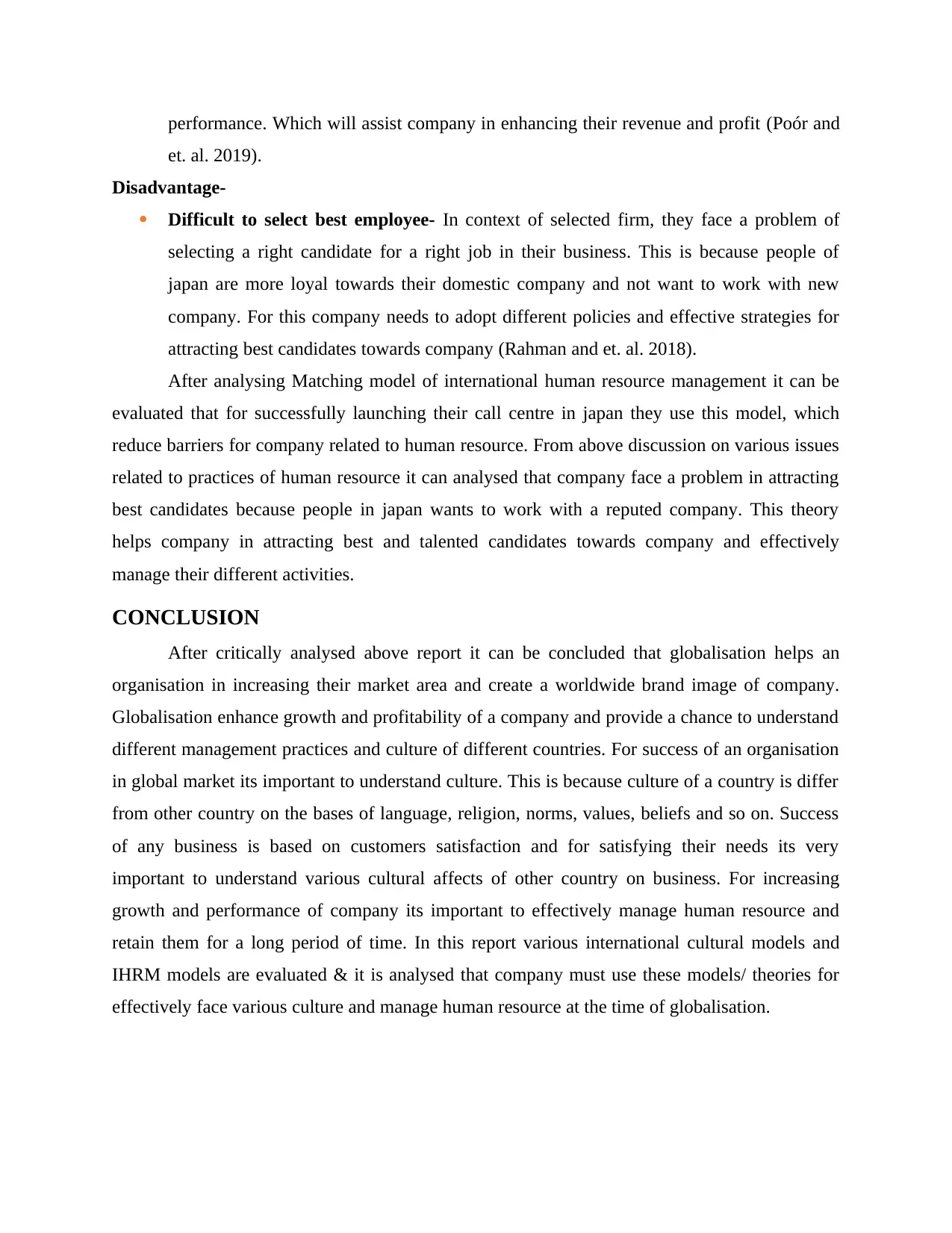
performance. Which will assist company in enhancing their revenue and profit (Poór and
et. al. 2019).
Disadvantage-
Difficult to select best employee- In context of selected firm, they face a problem of
selecting a right candidate for a right job in their business. This is because people of
japan are more loyal towards their domestic company and not want to work with new
company. For this company needs to adopt different policies and effective strategies for
attracting best candidates towards company (Rahman and et. al. 2018).
After analysing Matching model of international human resource management it can be
evaluated that for successfully launching their call centre in japan they use this model, which
reduce barriers for company related to human resource. From above discussion on various issues
related to practices of human resource it can analysed that company face a problem in attracting
best candidates because people in japan wants to work with a reputed company. This theory
helps company in attracting best and talented candidates towards company and effectively
manage their different activities.
CONCLUSION
After critically analysed above report it can be concluded that globalisation helps an
organisation in increasing their market area and create a worldwide brand image of company.
Globalisation enhance growth and profitability of a company and provide a chance to understand
different management practices and culture of different countries. For success of an organisation
in global market its important to understand culture. This is because culture of a country is differ
from other country on the bases of language, religion, norms, values, beliefs and so on. Success
of any business is based on customers satisfaction and for satisfying their needs its very
important to understand various cultural affects of other country on business. For increasing
growth and performance of company its important to effectively manage human resource and
retain them for a long period of time. In this report various international cultural models and
IHRM models are evaluated & it is analysed that company must use these models/ theories for
effectively face various culture and manage human resource at the time of globalisation.
et. al. 2019).
Disadvantage-
Difficult to select best employee- In context of selected firm, they face a problem of
selecting a right candidate for a right job in their business. This is because people of
japan are more loyal towards their domestic company and not want to work with new
company. For this company needs to adopt different policies and effective strategies for
attracting best candidates towards company (Rahman and et. al. 2018).
After analysing Matching model of international human resource management it can be
evaluated that for successfully launching their call centre in japan they use this model, which
reduce barriers for company related to human resource. From above discussion on various issues
related to practices of human resource it can analysed that company face a problem in attracting
best candidates because people in japan wants to work with a reputed company. This theory
helps company in attracting best and talented candidates towards company and effectively
manage their different activities.
CONCLUSION
After critically analysed above report it can be concluded that globalisation helps an
organisation in increasing their market area and create a worldwide brand image of company.
Globalisation enhance growth and profitability of a company and provide a chance to understand
different management practices and culture of different countries. For success of an organisation
in global market its important to understand culture. This is because culture of a country is differ
from other country on the bases of language, religion, norms, values, beliefs and so on. Success
of any business is based on customers satisfaction and for satisfying their needs its very
important to understand various cultural affects of other country on business. For increasing
growth and performance of company its important to effectively manage human resource and
retain them for a long period of time. In this report various international cultural models and
IHRM models are evaluated & it is analysed that company must use these models/ theories for
effectively face various culture and manage human resource at the time of globalisation.
⊘ This is a preview!⊘
Do you want full access?
Subscribe today to unlock all pages.

Trusted by 1+ million students worldwide
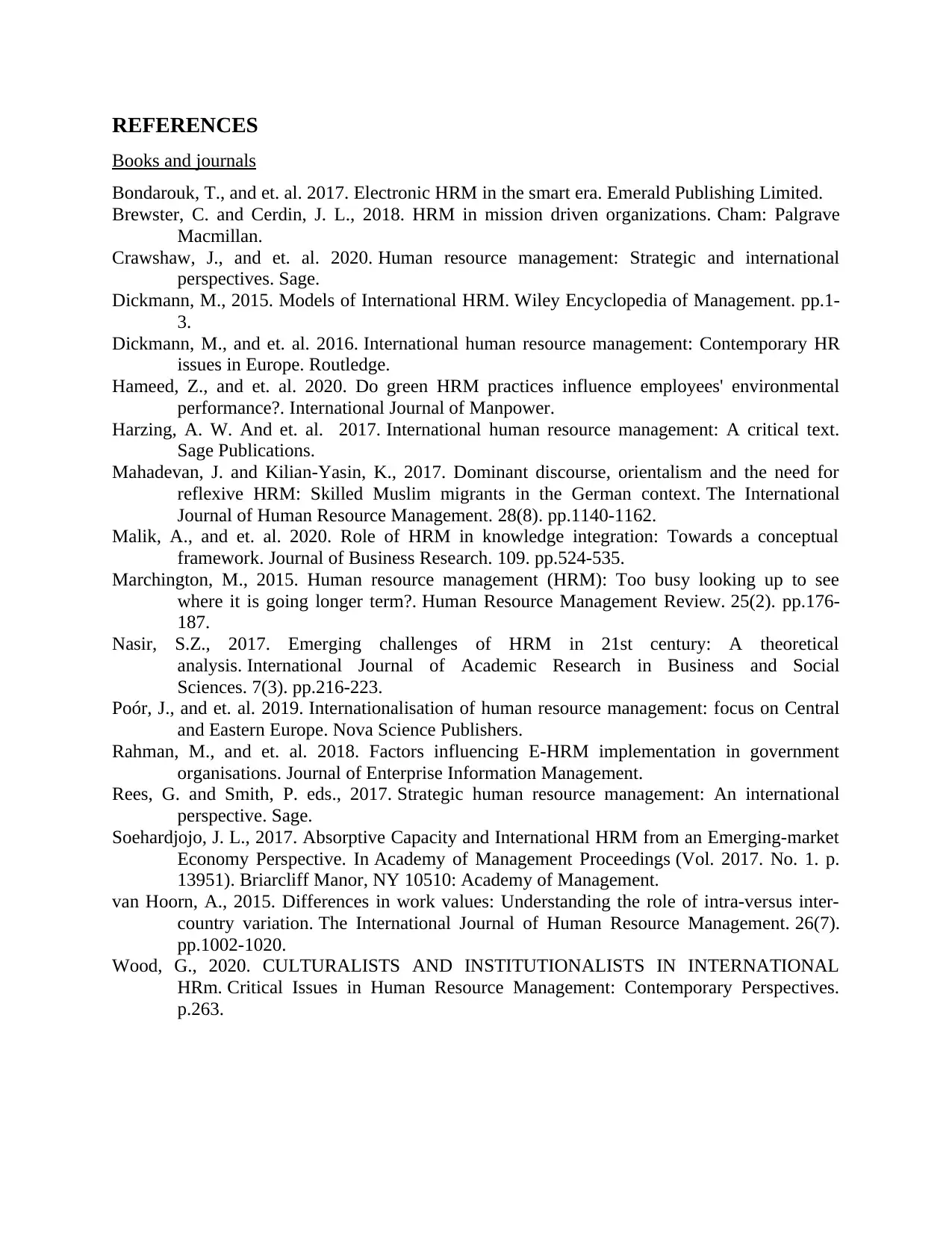
REFERENCES
Books and journals
Bondarouk, T., and et. al. 2017. Electronic HRM in the smart era. Emerald Publishing Limited.
Brewster, C. and Cerdin, J. L., 2018. HRM in mission driven organizations. Cham: Palgrave
Macmillan.
Crawshaw, J., and et. al. 2020. Human resource management: Strategic and international
perspectives. Sage.
Dickmann, M., 2015. Models of International HRM. Wiley Encyclopedia of Management. pp.1-
3.
Dickmann, M., and et. al. 2016. International human resource management: Contemporary HR
issues in Europe. Routledge.
Hameed, Z., and et. al. 2020. Do green HRM practices influence employees' environmental
performance?. International Journal of Manpower.
Harzing, A. W. And et. al. 2017. International human resource management: A critical text.
Sage Publications.
Mahadevan, J. and Kilian-Yasin, K., 2017. Dominant discourse, orientalism and the need for
reflexive HRM: Skilled Muslim migrants in the German context. The International
Journal of Human Resource Management. 28(8). pp.1140-1162.
Malik, A., and et. al. 2020. Role of HRM in knowledge integration: Towards a conceptual
framework. Journal of Business Research. 109. pp.524-535.
Marchington, M., 2015. Human resource management (HRM): Too busy looking up to see
where it is going longer term?. Human Resource Management Review. 25(2). pp.176-
187.
Nasir, S.Z., 2017. Emerging challenges of HRM in 21st century: A theoretical
analysis. International Journal of Academic Research in Business and Social
Sciences. 7(3). pp.216-223.
Poór, J., and et. al. 2019. Internationalisation of human resource management: focus on Central
and Eastern Europe. Nova Science Publishers.
Rahman, M., and et. al. 2018. Factors influencing E-HRM implementation in government
organisations. Journal of Enterprise Information Management.
Rees, G. and Smith, P. eds., 2017. Strategic human resource management: An international
perspective. Sage.
Soehardjojo, J. L., 2017. Absorptive Capacity and International HRM from an Emerging-market
Economy Perspective. In Academy of Management Proceedings (Vol. 2017. No. 1. p.
13951). Briarcliff Manor, NY 10510: Academy of Management.
van Hoorn, A., 2015. Differences in work values: Understanding the role of intra-versus inter-
country variation. The International Journal of Human Resource Management. 26(7).
pp.1002-1020.
Wood, G., 2020. CULTURALISTS AND INSTITUTIONALISTS IN INTERNATIONAL
HRm. Critical Issues in Human Resource Management: Contemporary Perspectives.
p.263.
Books and journals
Bondarouk, T., and et. al. 2017. Electronic HRM in the smart era. Emerald Publishing Limited.
Brewster, C. and Cerdin, J. L., 2018. HRM in mission driven organizations. Cham: Palgrave
Macmillan.
Crawshaw, J., and et. al. 2020. Human resource management: Strategic and international
perspectives. Sage.
Dickmann, M., 2015. Models of International HRM. Wiley Encyclopedia of Management. pp.1-
3.
Dickmann, M., and et. al. 2016. International human resource management: Contemporary HR
issues in Europe. Routledge.
Hameed, Z., and et. al. 2020. Do green HRM practices influence employees' environmental
performance?. International Journal of Manpower.
Harzing, A. W. And et. al. 2017. International human resource management: A critical text.
Sage Publications.
Mahadevan, J. and Kilian-Yasin, K., 2017. Dominant discourse, orientalism and the need for
reflexive HRM: Skilled Muslim migrants in the German context. The International
Journal of Human Resource Management. 28(8). pp.1140-1162.
Malik, A., and et. al. 2020. Role of HRM in knowledge integration: Towards a conceptual
framework. Journal of Business Research. 109. pp.524-535.
Marchington, M., 2015. Human resource management (HRM): Too busy looking up to see
where it is going longer term?. Human Resource Management Review. 25(2). pp.176-
187.
Nasir, S.Z., 2017. Emerging challenges of HRM in 21st century: A theoretical
analysis. International Journal of Academic Research in Business and Social
Sciences. 7(3). pp.216-223.
Poór, J., and et. al. 2019. Internationalisation of human resource management: focus on Central
and Eastern Europe. Nova Science Publishers.
Rahman, M., and et. al. 2018. Factors influencing E-HRM implementation in government
organisations. Journal of Enterprise Information Management.
Rees, G. and Smith, P. eds., 2017. Strategic human resource management: An international
perspective. Sage.
Soehardjojo, J. L., 2017. Absorptive Capacity and International HRM from an Emerging-market
Economy Perspective. In Academy of Management Proceedings (Vol. 2017. No. 1. p.
13951). Briarcliff Manor, NY 10510: Academy of Management.
van Hoorn, A., 2015. Differences in work values: Understanding the role of intra-versus inter-
country variation. The International Journal of Human Resource Management. 26(7).
pp.1002-1020.
Wood, G., 2020. CULTURALISTS AND INSTITUTIONALISTS IN INTERNATIONAL
HRm. Critical Issues in Human Resource Management: Contemporary Perspectives.
p.263.
1 out of 10
Related Documents
Your All-in-One AI-Powered Toolkit for Academic Success.
+13062052269
info@desklib.com
Available 24*7 on WhatsApp / Email
![[object Object]](/_next/static/media/star-bottom.7253800d.svg)
Unlock your academic potential
Copyright © 2020–2026 A2Z Services. All Rights Reserved. Developed and managed by ZUCOL.



